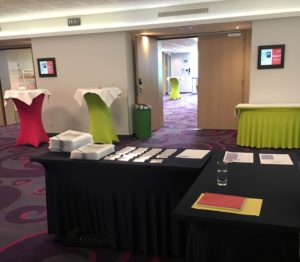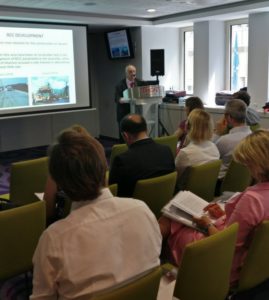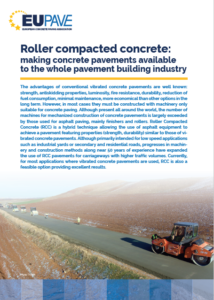Impressive testimonials on RCC at EUPAVE’s workshop on Best Practices
25/06/2019
On Tuesday 18th June, EUPAVE held at the Thon Hotel EU in Brussels its 4th workshop on Best Practices in Concrete Paving. The theme for this year was “Hydraulically Bound Base Layers & Roller Compacted Concrete Pavements”. Attended by around 35 participants, the workshop gathered experts who have an interest in RCC in particular
During this event various topics were discussed over the day starting with hydraulically bound base layers, a general introduction on Roller Compacted Concrete (RCC) and the promotion of RCC across Europe. The situation of RCC in Turkey and the market of RCC in the U.S were also presented.
Each participant received a copy of EUPAVE’s new publication “Roller compacted concrete: making concrete pavements available to the whole pavement building industry”. You can find here the publication.
Mr. Stéphane Nicoud, president of EUPAVE, opened the workshop on behalf of its vice-president, Rory Keogh. He welcomed the attendees and thanked them for their presence.
Mr. Nicoud gave a special welcome to EUPAVE members and partners and introduced EUPAVE’s working groups on Best Practices, Concrete Safety Barriers, Environmental Strategy, EU Advocacy and Communication strategy. He also informed the participants about EUPAVE’s newsletter and different affiliations. He finished his introduction by an overview of the previous workshops on Best Practices organised since 2015.
Mrs. Colette Grégoire, Senior Researcher at the Belgian Road Research Center (BRRC) gave a presentation on the “standards, materials and tests methods” of Hydraulically Bound Base Layers.
Mr. Luc Rens, managing director of EUPAVE, presented the “design, construction and performances” of Hydraulically Bound Base Layers. His presentation focused on the choice of base layer, the different types of HBBL, the construction techniques and ended by final considerations such as the circular economy and climate-resilience.
Mr. Carlos Jofré, consultant, gave a general introduction on Roller Compacted Concrete Pavements. Mr. Jofré explained in which cases using RCC pavements is interesting and where to use them. He went back on the market of RCC pavements and gave some technical information.
Mr. Mathew Tranter from Cemex UK and Mr. José M. Merino, from Cemex Spain highlighted the RCC promotion across Europe.
Following the coffee break, Mr. Ozgur Yaman presented the RCC pavements in Turkey. Mr. Yaman showed the different applications in Turkey and what lessons have been learned regarding the construction of the roads.
Mrs. Anne Beeldens, consultant at AB-Roads, gave a presentation on behalf of Corey Zollinger, Director Paving Solution at Cemex and Chairman of RCC Pavement Council, on the market of RCC pavements in the U.S.
An open discussion followed the presentations.
Finally Stéphane Nicoud drew the main conclusions of the workshop:
- Hydraulically Bound Base Layers are a good solution for all types of pavements
- Several types are available depending on the design parameters,
- The preliminary design study is a good start,
- The resistance to erosion can be more important than just strength
- They fit in the framework of “circular economy” and “climate resilience”.
- RCC pavements are increasingly applied all over the world:
- Equipment are widely available,
- Properties are similar to conventional concrete,
- Mainly for low speed applications,
- Further developments in surface finishing are ongoing,
- A good way to get started with concrete pavements.
The workshop was followed by a cocktail at the hotel restaurant.
- Stéphane Nicoud, president of EUPAVE
- Colette Grégoire, BRRC
- Carlos Jofré, Consultant
- José M. Merino, Cemex
- Ozgur Yaman, TCMA
- EUPAVE new publication on Roller Compacted Concrete Pavement









